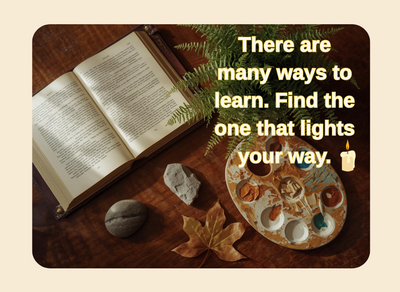By Threshold Learning Hub | An Alighten Ministry Program
Education, at its heart, is an act of formation. Not just of the mind, but of the whole person.
Across time and culture, teachers, parents, and visionaries have developed distinctive approaches to learning, each reflecting unique beliefs about how children grow, thrive, and discover truth.
At Threshold Learning Hub, we invite families to explore these educational philosophies—not as rigid systems, but as sources of inspiration. Understanding them helps parents shape an intentional learning environment aligned with their values, faith, and vision for their children.
A Tour of Educational Philosophies
1. Reggio Emilia Approach
Originating in post-war Italy, the Reggio Emilia philosophy views children as capable, curious, and deeply creative learners. Education is seen as a partnership between the child, the teacher, and the environment, often called the “third teacher.”
-
Core Values: Collaboration, exploration, documentation, and aesthetic beauty.
-
At Home: Encourage inquiry through art, journaling, and project-based discovery.
2. Montessori Education
Founded by Dr. Maria Montessori, this method emphasizes independence, order, and hands-on exploration. The teacher’s role is to guide rather than instruct, observing each child’s natural pace and readiness.
-
Core Values: Self-directed learning, concentration, respect for the child, and purposeful movement.
-
At Home: Provide access to real tools, daily life skills, and uninterrupted work periods.
3. Waldorf Education
Developed by Rudolf Steiner, Waldorf education integrates the arts, imagination, and holistic development. Each stage of childhood corresponds to specific developmental needs, and rhythm, beauty, and storytelling are central.
-
Core Values: Creativity, moral imagination, and developmental harmony.
-
At Home: Create daily rhythms, engage in handcrafts, nature walks, and rich storytelling.
4. Forest School
Rooted in outdoor education movements, Forest School immerses children in natural environments for experiential learning. Nature becomes both classroom and curriculum, fostering resilience, observation, and environmental stewardship.
-
Core Values: Outdoor play, risk-taking, teamwork, and environmental care.
-
At Home: Dedicate regular time to learning outdoors—gardening, exploring, or journaling in nature.
5. Farm School
Similar to Forest School, Farm Schooling connects education with land, animals, and sustainable living. Children learn responsibility, biology, and life skills through real-world engagement.
-
Core Values: Work ethic, stewardship, community, and practical wisdom.
-
At Home: Tend a garden, care for animals, or explore agricultural science through hands-on experience.
6. Unschooling
Pioneered by John Holt, Unschooling trusts children’s innate curiosity and allows learning to unfold naturally through life experiences. Parents act as facilitators rather than instructors.
-
Core Values: Freedom, intrinsic motivation, real-world learning, and autonomy.
-
At Home: Follow your child’s interests deeply, support exploration without imposing rigid schedules.
7. Cooperative Schooling (Co-ops)
Homeschool co-ops allow families to share resources, classes, and expertise, blending the flexibility of home learning with the social richness of group learning.
-
Core Values: Community, collaboration, and shared responsibility.
-
At Home: Join or form local co-ops for science labs, art, literature circles, or service projects.
8. Homeschooling (Traditional or Eclectic)
Homeschooling spans a wide spectrum from structured classical education to eclectic, personalized learning. Families often blend methods to create a customized experience.
-
Core Values: Family-centered learning, adaptability, faith integration, and academic freedom.
-
At Home: Use curriculum as a tool, not a master: let learning flow from your child’s curiosity and family mission.
9. Christian Education
Faith-based schooling, whether at home or in institutions, integrates spiritual formation with academic learning. Biblical truth becomes the foundation for understanding the world.
-
Core Values: Wisdom, virtue, and spiritual growth.
-
At Home: Include Scripture, prayer, and reflection as part of the learning rhythm.
10. Private Schools
Private schools vary widely. Some faith-based, others independent or college preparatory. They often emphasize small class sizes, specialized programs, and mission-driven education.
-
Core Values: Excellence, character, and individualized attention.
11. Charter Schools
Publicly funded but independently operated, charter schools often innovate within specialized focuses: arts, STEM, classical studies, or language immersion.
-
Core Values: Innovation, accountability, and academic rigor.
12. Sudbury & Summerhill (Democratic Schools)
These schools operate on principles of democracy, where students and staff share equal voice in governance and learning is entirely self-directed.
-
Core Values: Freedom, equality, and personal responsibility.
-
At Home: Encourage voice and choice. Invite your children into decision-making about their learning.
13. Charlotte Mason Education
(An essential philosophy to include.) Mason’s 19th-century approach emphasized living books, habit formation, and exposure to art, nature, and moral ideas.
-
Core Values: Education as an atmosphere, a discipline, and a life.
-
At Home: Read rich literature aloud, keep nature journals, and focus on beauty, order, and virtue.
14. Classical Education
Rooted in the ancient trivium: grammar, logic, and rhetoric. This approach cultivates wisdom and eloquence through great books and Socratic discussion.
-
Core Values: Truth, goodness, beauty, and critical thinking.
-
At Home: Emphasize reading, discussion, and moral reasoning grounded in faith and history.
Finding Your Fit
Exploring these philosophies is not about choosing a single label, it’s about discovering what resonates.
Some families find home in one tradition; others blend several. What matters most is the alignment between your philosophy, your child’s nature, and your family’s faith and values.
At Threshold Learning Hub, we help families navigate this journey with reflection and grace, offering personalized curriculum support and mentorship to bring your learning philosophy to life.
There is no one “right” way to learn, only the path that nurtures the whole person, honors each child’s God-given design, and leads toward truth, goodness, and joy.
May your exploration of learning philosophies become a journey of discovery, one that strengthens your home, deepens your faith, and lights your way forward. 🌿
